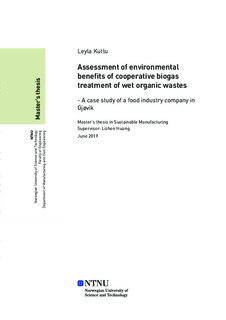Assessment of environmental benefits of cooperative biogas treatment of wet organic waste
Master thesis
Permanent lenke
http://hdl.handle.net/11250/2619879Utgivelsesdato
2019Metadata
Vis full innførselSamlinger
Sammendrag
Bedrifter ønsker i stadig større grad å være bærekraftige og praktisere sirkulær økonomi in deres mål for å bidra positivt til samfunnet og naturen. Denne masteroppgaven undersøker en mellomstor potet foredlingsbedrift på Gjøvik som presentere deres produksjonslinje som sirkulær praksis, men som ønsker å teste ut alternative muligheter for avfallshåndtering av overflødig drank fra etanol-produksjon, som blir spredt på åker. Gjennom litteraturgjennomgang om avfallhåndtering, sirkulær økonomi og bærekraft, ble biogass produksjon ansett som en alternativ mulighet. Hypotesen for studien for denne oppgaven er: Biogassproduksjon av drank er en miljømessig bærekraftig løsning for avfallshåndtering sammenlignet med dagens praksis for avfallshåndtering. Det er får studier i Norge om miljømessige aspekter av biogassproduksjon fra våtorganisk avfall i samhandling og samarbeid og denne studien er et bidrag til kunnskapsbasen om caser av industriell symbiose.To scenarier ble valgt for videre analyse. Scenario 1, sambehandling av drank, storfegjødsel og restavlinger av grønnsaker og poteter, og scenario 2, sambehandling av drank, storfegjødsel og rent matavfall fra naboområdet. Det ble gjort en analyse av økonomiske, og tekniske aspekter basert på litteraturgjennomgang. En mer grundig miljøanalyse ble gjort gjennom en livssyklusanalyse der kategoriene klimaendringer, forsuring, eutrofiering, utarming av minerale og fossile ressurser og menneskelig toksisitet ble undersøkt. Data for analysen var i stor grad basert på sekundære kilder da biogass-scenariene ikke er nåværende praksiser.Funn tilsier at biogassproduksjon av drank har mest positiv effekt på miljøkategoriene, unntatt for forsuring. Biogass for transportbrensel hos busser har mest positiv effekt for klimaendringer, mens biogass for elektrisitet og varme-bruk er det beste valget når det gjelder menneskelig toksisitet, og eutrofiering. Det første bekrefter litteratur, mens det er færre studier som undersøker lignende scenarier for toksisitet.Konklusjonen er at biogassproduksjon er miljømessig det beste alternativet sammenlignet med nåværende praksiser. Men grove kostnads -og inntektsestimater av biogass-scenariene antyder at økonomisk støtte for investeringer og høyere biogassutbytte per volum av substrat trengs for å gjøre dette produksjonen til et økonomisk levedyktig alternativ for bedriften i nær framtid. Businesses are increasingly aiming to be sustainable and practice circular economy in their efforts to contribute positively to human and environmental health. The master thesis investigates a medium size potato processing company in Gjøvik, which presents their production line as circular, but that would like to test alternative waste management options for the excess potato ethanol stillage, which is spread on farm fields. Through literature review on waste management, circular economy and sustainability, biogas treatment was found to be an alternative. The hypothesis to be tested: Biogas treatment of potato ethanol stillage is an environmentally sustainable solution compared to today’s waste management at the company. There are few studies in Norway on environmental aspects of medium sized biogas treatment of wet organic wastes in collaboration and the thesis is a contribution to the knowledge on cases of industrial symbiosis. Two scenarios were considered the most optimal for further analysis. Scenario 1, co-digestion of stillage, cattle manure and vegetables and potatoes farm field residues and scenario 2, co-digestion of stillage, cattle manure and clean food waste from the neighbouring area. An analysis based on a literature review of economic, and technical aspects was done. A more in-depth environmental assessment was carried out through a Life Cycle Assessment (LCA), analysing the impact categories climate change, acidification, terrestrial eutrophication, mineral and fossil resource depletion, and human toxicity (non-cancer and cancer effects). The data for the assessment were largely secondary data, as the biogas scenarios are not current practices.It was found that biogas treatment in both scenarios have the most positive environmental impact, except for acidification. Biogas for the use of bus transport fuel has the most positive impacts on climate change, while biogas for the use of electricity and heat was the best option in terms of human toxicity, and terrestrial eutrophication. The first confirms literature, while there are fewer studies on the other categories in similar scenarios.The conclusion is that biogas is environmentally the best option compared with current practices. However, rough cost/income estimations of the biogas scenarios suggest that financial support for investments and higher biogas yield per amount of substrate is needed to make biogas treatment an economically viable option for the company in the nearby future.
